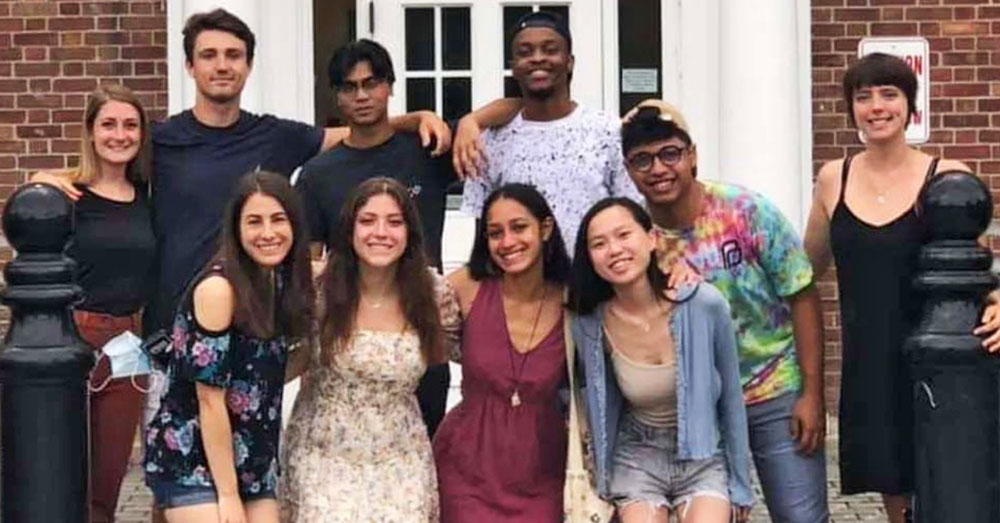
Mental health is top of mind for SUNY Plattsburgh student Erick Yusufu. He knows it impacts not only the moment, but all the activities a person attempts to participate in. He tells us, “if your mental health is not in a good state your whole day will be affected, the way you react to things, the way you at toward things, even the way you conduct yourself is going to be very effected.”
Mental health is something that Yusufu thinks about every day, and notes that “[mental health is a] very, very important part of my life. It plays a huge role in defining who I am because if I have a bad mental health I would like to think I’m not going in the right direction or I’m not pursuing my purpose in life.”
One of his favorite ways to make time for himself is to reconnect with nature, spend time with friends, and make a concerted effort to reflect on his daily life and make sure he’s connecting with the outside world and society. Of course, some of these self-care options were impacted by the pandemic, and in turn, Yusufu found his mental health challenged due to isolation.
“Last semester when it was prime COVID and everything, my mental health was very challenged. Staying inside, quarantining and stuff was very challenging. … Something that helped me a lot was talking with my friends about it and just reaching out to other people … just to have that sense of communicating and airing out my concerns and what I was feeling and what I was going through,” says Yusufu.
When he reached out to his support network, he realized that he wasn’t the only one feeling this way and was able to find comfort in knowing he wasn’t alone. The advice that was given to him was an added benefit. With these options, Yusufu was able to find the silver lining in the pandemic – it afforded him the opportunity to learn about how to take better care of his mental health and that mental health struggles can happen to anyone.
Using Body Movement and Soccer as a Form of Therapy
With his friends’ support and the drive to stay active, Yusufu has found that getting involved through on-campus activities and events has really helped his mental health, with soccer being his favorite way to remove the stress.
“Soccer means a great deal to me. I’ve grown up playing the game, I love playing the game. Whenever I step into the pitch … I try to outperform myself, I push myself to perform better than yesterday,” says Yusufu.
He also recognizes that soccer is another way for him to strengthen his mental health, “Whenever I play soccer, mental health plays a very big role because soccer is not only a physical game, it’s also a mental game. You have to have your head in the game. If your mentality is not really focused on the game that could really affect how you play in the game, and also how you act and cooperate toward your teammates. … It makes me feel way better because suppose maybe I have a very bad day but I go to the football pitch, play very well, and we win the game… it just gives me a sense of relief.”
Advocating for Student Mental Health at SUNY Plattsburgh
As a community advocate at SUNY Plattsburgh, Yusufu has provided his peers with information about the campus counseling center and has received a lot of positive feedback from classmates regarding the center.
“The reviews I have gotten from different students is that they’re very, very helpful, very friendly, and very good people to go to and just talk to even if you think that … ‘my mental health is very well.’ It’s just good to go there and to check up on yourself and have a conversation with someone else and just get a different perspective from their experience,” says Yusufu.
In his community advocate role, Yusufu is in charge of the building and the residents who live in the hall. And, Yusufu is a big proponent of keeping an open line of communication with his peers to ensure someone is there to support students during their time at SUNY Plattsburgh.
Yusufu notes, “residents can reach out to me whenever they have any problems or are going through stress, or they are uncomfortable with their roommates or uncomfortable with their resident life. They reach out to me first and then I advocate their problems to the school, or I recommend other solutions to them.”
Part of Yusufu’s job responsibility as a community advocate is putting together programming for residents, and as of late, the focus has been on mental health programs. Thus far, Yusufu has invited counseling center staff to connect with students and to help them feel more comfortable talking about mental health. When it comes to stigma surrounding these subjects, Yusufu shares that everyone can have mental health concerns, so the stigma should not exist:
“It’s very normal to have mental health problems because it’s normal in life. You have challenges, you’re going to be sad, you’re going to have life crisis and life problems, it’s life. There are always ups and downs, so I don’t think it’s right to have stigma on people who have problems and issues. … You’re not alone in this, people face these issues and the best way to solve it or feel comfortable about it is to talk to somebody and have them give you a different perspective and their ways on how they solve their problems.”
Finding Support Through Talking to Others
When asked what advice he would give to someone who is going through a tough time and doesn’t know where to turn, Yusufu noted that talking to other people is a great way to work through things:
“Communication can go a very long way. Just have the conversation, speak up, talk about your problems with someone you trust and someone who can think and guide you through the way. … Don’t let the problems or issues eat you up. It’s going to affect you very much. … If you’re not comfortable talking about it, find a way to find guidance or an expert that can give you a sense of direction toward approaching the problem.
Yusufu also shared what works best for him during tough times—watching motivational videos, with his favorites being Denzel Washington and Les Brown:
“These videos can really go a long way. The words that they say, or the words that they speak about in these motivational videos can really help you move from one point to another.”
Erick sat down with us for an extended conversation about mental health and what can be done to stay on top of your own personal care. Watch that conversation below:
Resources to Help Make Mental Health Care Routine
There are many ways to stay on top of your mental health, from talking to friends and family about your problems to setting a counseling routine with a trained professional. Throughout the SUNY system, each campus either has an on-campus counseling center or provides access to community mental health resources to help students. If you or a friend is in need of help, visit SUNY’s mental health resources page.
If you are currently experience a crisis, reach out to one of the following resources:
National Suicide Prevention Lifeline:
1-800-273-8255
(1-800-273-TALK)
New York State COVID-19 Emotional Support Hotline:
1-844-863-9314
Veterans Crisis Line:
- Call: 1-800-273-8255 (1-800-273-TALK) and Press 1
- Text: 838255
- Chat: https://www.veteranscrisisline.net/get-help/chat
Support for deaf and hard of hearing:
- Chat and text message (838255)
- For TTY users: Use your preferred relay service or dial 711 then 1-800-273-8255. Or chat with us.



